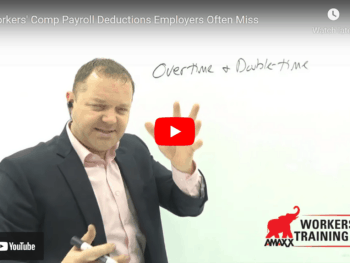Injured workers feel it is “them” against the employer. Sometimes they think insurance companies live to deny claims – of any type. So, okay – now and then we hear of an insurer who denies claims left and right, but in truth most claims are accepted.
Bad claims are not claims with serious injuries. “Bad claims” share these characteristics.
- Reported late to the employer.
- Reported late to the carrier.
- Incomplete paperwork.
- Delayed medical treatment.
- Prior non-work related surgery to the same injured body part.
- Injury reported to the wrong person.
- Unwitnessed injuries.
- Injury due to unsafe work practices.
Click Link to Access Free PDF Download
“Workers’ Comp Claims Review Checklist: 9 Must-Have, Serious-Impact Elements”
A prior “bad claim” does not mean a new injury claims are automatically denied. It means the adjuster may take longer to complete the investigation before deciding if the claim is compensable.
Employers with few workplace injury claims may experience more “bad claims” because they have less interaction with the carrier or third-party administrator. Lack of follow through occurs when employers, not knowing what to do, send claims to the agent who may delay a few months before sending them on to the carrier. Employers must establish a workflow system for submitting all claims to avoid delays in treatment or coverage for the injured worker and a quick claim resolution.
An efficient claim workflow looks like this:
The injury is reported by the injured worker to the supervisor who reports to the manager who reports to human resources who reports to the insurance carrier.
Failure to report claims to the carrier ranks highest in bad claims. When in doubt, call the adjuster or carrier and ask if the claim is reportable. The sooner an adjuster is involved, the quicker the outcome.
A claim reported four months after the injury because tomorrow the injured worker scheduled for surgery makes for an unhappy adjuster who needs time to complete an investigation. And, delay does not bode well for the worker whose surgery is delayed and recovery compromised.
It is hard going back four months asking witnesses to remember what occurred; requesting and obtaining medical records; doing a proper background check to determine if there is a prior injury with the current or previous employer for the same type of injury.
Summary
Prevent claims from “going bad” by immediately reporting them to give the adjuster time to investigate. Unreported claims often are compensable, but valuable time is lost when the adjuster must backtrack several months to prove that point and then treatment and other benefits for the injured worker are delayed. As an employer, you want to be sure when a claim is denied it is done properly and ethically.
Author Rebecca Shafer, JD, President of Amaxx Risks Solutions, Inc. is a national expert in the field of workers compensation. She is a writer, speaker, and website publisher. Her expertise is working with employers to reduce workers compensation costs, and her clients include airlines, healthcare, printing/publishing, pharmaceuticals, retail, hospitality, and manufacturing. See www.LowerWC.com for more information. Contact: RShafer@ReduceYourWorkersComp.com or 860-553-6604.
Our WC Manual: http://corner.advisen.com/partners_wctoolkit_book.html
WORK COMP CALCULATOR: http://www.LowerWC.com/calculator.php
MODIFIED DUTY CALCULATOR: http://www.LowerWC.com/transitional-duty-cost-calculator.php
WC GROUP: http://www.linkedin.com/groups?homeNewMember=&gid=1922050/
SUBSCRIBE: Workers Comp Resource Center Newsletter
Do not use this information without independent verification. All state laws vary. You should consult with your insurance broker or agent about workers comp issues.
©2011 Amaxx Risk Solutions, Inc. All rights reserved under International Copyright Law. If you would like permission to reprint this material, contact Info@ReduceYourWorkersComp.com.

























